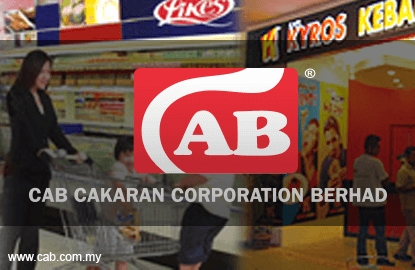
This article first appeared in The Edge Financial Daily, on February 2, 2016.
KUALA LUMPUR: CAB Cakaran Corp Bhd, the largest poultry player in the northern region, is eyeing to hit RM1 billion in revenue for the current financial year ending Sept 30, 2016 (FY16), after missing the target in FY15.
The group recorded a net profit of RM16.04 million on revenue of RM891.69 million in FY15.
“In FY16, we are confident of hitting the RM1 billion revenue target, driven by capacity expansion at our existing farms and the full-year contribution from our 51% stake in Tong Huat Poultry Processing Factory Pte Ltd,” CAB group managing director Christopher Chuah Hoon Phong told The Edge Financial Daily in an interview last week.
The entry of Indonesian tycoon Anthoni Salim, who is chairman of Salim Group, into CAB will provide further excitement going forward.
CAB currently operates 10 breeder farms and 140 broiler farms in Peninsular Malaysia, contributing about three-quarters of its revenue. Its farms have capacity of around 4.5 million birds a month, which it targets to increase to five million birds a month in FY16.
The group completed a 51% acquisition of Tong Huat, a licensed slaughterhouse in Singapore in June last year, which contributed approximately 25% of its bottom line in FY15.
In December last year, CAB piqued the interest of the investing fraternity when it announced that it had inked a memorandum of understanding with KMP Pte Ltd, an investment holding company of Salim Group, to establish a fully integrated poultry business in Indonesia.
Salim Group is one of Indonesia’s largest conglomerate with assets like Indofood Sukses Makmur, which is the world’s largest instant noodle producer.
Both CAB and KMP will study the possibility of having a joint venture (JV), in which Salim Group’s special-purpose vehicle will initially hold a 90% stake and CAB 10%.
However, CAB will have an option to increase its shareholding up to 30% in the next three years after the initial set-up, depending on its financial condition.
On this, CAB group executive director Chew Chee Khong said both CAB and Salim Group are hoping to unlock the synergies from their collaboration.
“For us, the collaboration serves as a platform for us to tap into the Indonesian market, where we do not have a presence yet, and we will provide the technical and know-how aspects of setting up a poultry business to our partner.
“The JV company will pump in around RM500 million over a course of three years for the whole set-up of the poultry operations in Indonesia, and in three years, we are looking to have a production capacity of five million birds per month, which will be used for internal consumption of Indomaret, Salim Group’s chain of retail convenience stores as well as its other businesses,” he added.
With the ready demand from Salim Group’s convenience stores, CAB estimates that the JV company could generate RM1 billion in total revenue over the next three to five years.
On Jan 19, Anthoni emerged as a substantial shareholder of CAB and has been accumulating more shares in the poultry company since.
As of last Friday, Anthoni, through Plant Wealth Holdings Ltd, a company which he has an indirect 67% stake through KMP Investments Pte Ltd, held a 7.65% stake in CAB.
CAB on Jan 19 entered into a placement agreement with Plant Wealth for a proposed private placement of 15.06 million new CAB shares, representing a 9.1% stake, at an issue price of RM2.07 per placement share, which is expected to raise RM31.18 million in gross proceeds.
Together with the placement, Salim’s stake in CAB now stands at some 16.75%. The Edge Financial Daily previously reported that Salim Group could be eyeing as much as a 20% stake in CAB.
CAB, like most poultry companies, is family-owned, with the Chuah family being its controlling shareholder with a 53.57% stake. However, Chuah said his family will not trim their stake in the group.
“We still remain a family-run business. [It’s] just that now, we have been presented with a very good opportunity from a strategic partner to take our company to a new market, and we believe it is an opportune time to do so,” he said.
As for its first quarter of FY16 results, Chuah said traditionally the last three months of the year (October to December) are slow for the poultry industry.
“[The] average selling price of broilers is usually below RM4 per kg in the October to December period from RM4.63 per kg in [the] July to September quarter, due to lower consumer demand during the holiday season,” he said.